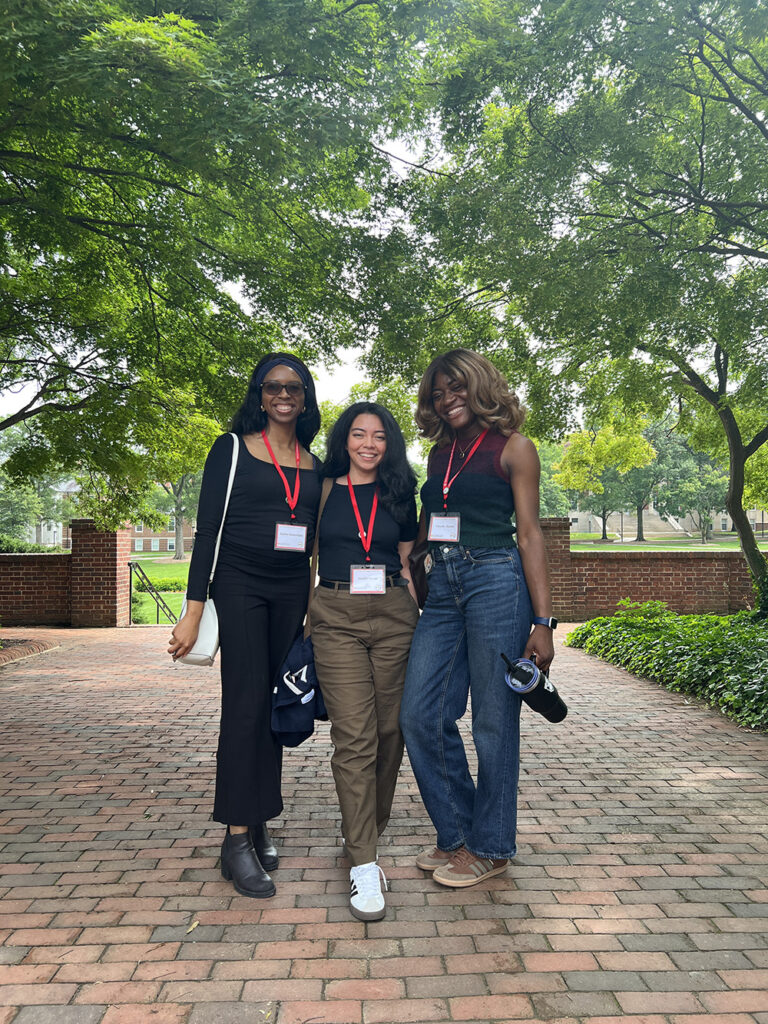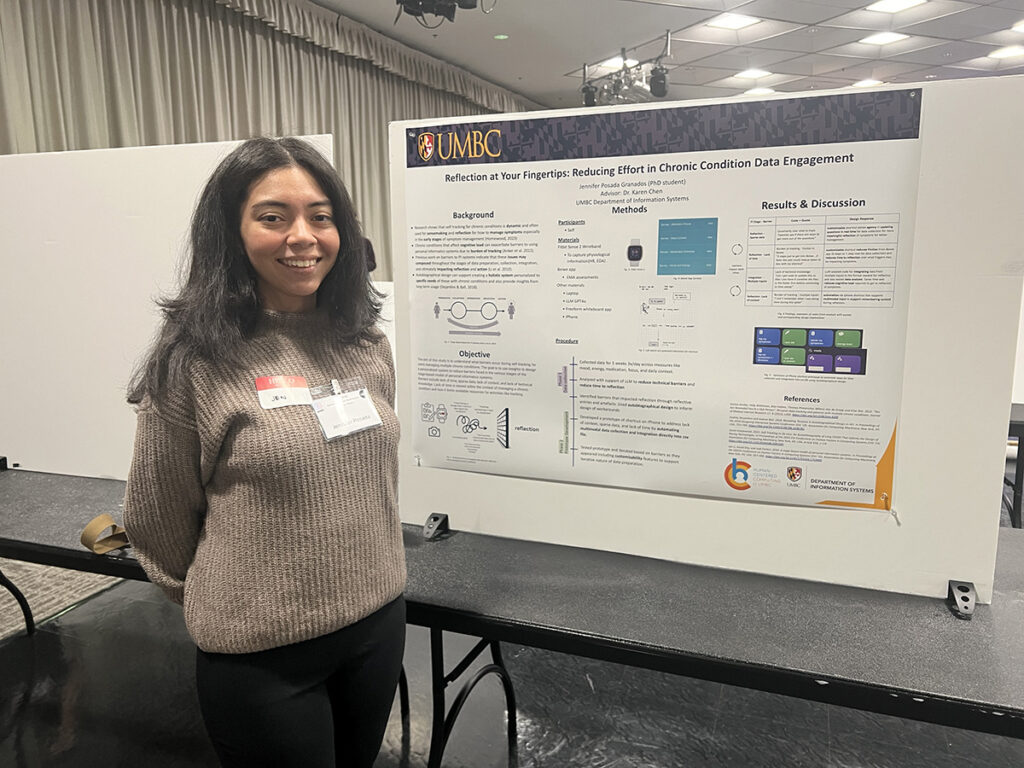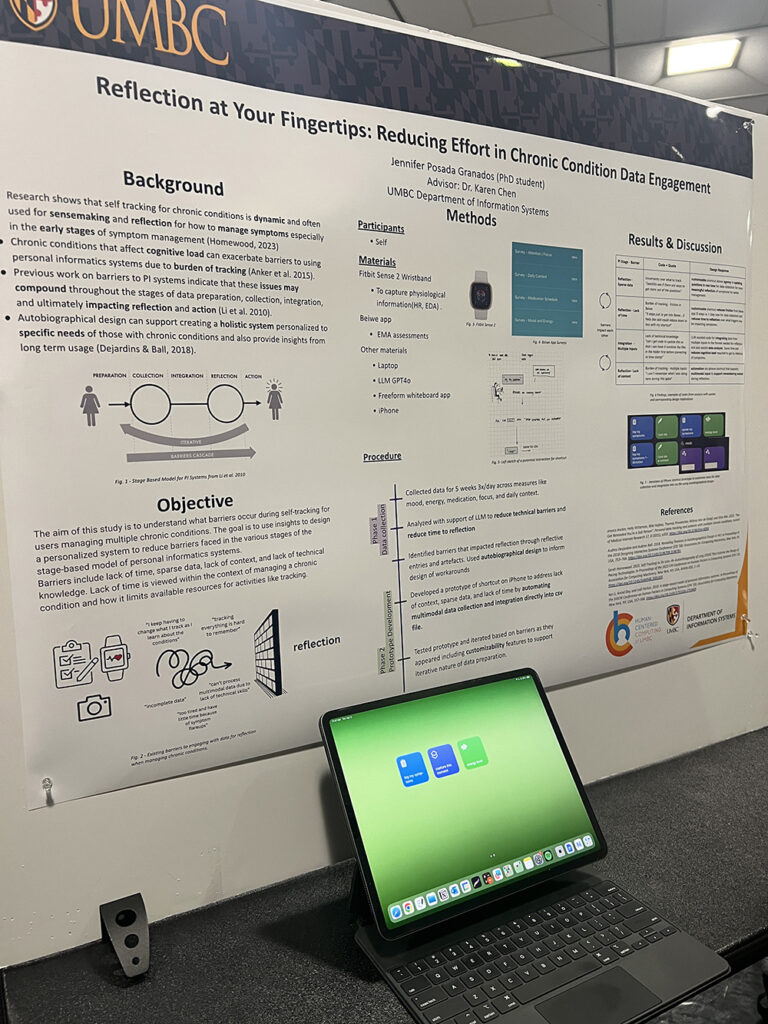Jennifer Posada ’21, psychology, and M.S. ’24, human-centered computing, is an interdisciplinary HCI researcher focused on designing systems that help users better understand their data. Jennifer’s research explores how AI, automation, and customized input methods can enhance data collection and sense-making, empowering users to create clear and compelling data stories.
Throughout her graduate career, she has also contributed to a range of projects, including developing equitable approaches to informal STEM education, investigating how 3D-printed maps can support blind and low-vision students in navigating campus environments, and examining how social biosignal sharing can foster a greater sense of belonging.
Outside of her research, Jennifer enjoys shooting film photography and creating art across various mediums.
She is currently a Ph.D. student in UMBC’s Human-Centered Computing program, focusing on AI research. Jennifer will present her work in an online talk on Wednesday, October 24, at noon, titled “Making Sense of Data with AI: Lowering Barriers, Expanding Who Participates.”
She was kind enough to answer some questions about her presentation, her research, and gives advice for current students interested in this research.
Information Systems: What inspired this particular focus on “lowering barriers” to data analysis through AI?
Jennifer Posada: I was inspired to focus on this during a research project I worked on in my masters program in 2023. GPT was just starting to gain traction and I had some biodata that needed clean timestamps so I could make sense of the data. I had limited time to do it manually as it was a week’s worth of very granular data and minimal technical knowledge to automate with code.
I was pleasantly surprised when GPT was able to make usable code for this goal. This experience eventually inspired me to take a data mining course because I felt empowered to do more data related tasks. It made me want to explore how other people with limited technical knowledge can overcome barriers to data analysis with their own data, be it personal health data, financial data or other everyday data.
Information Systems: Can you share an example of how tools like ChatGPT have changed the way you personally approach data analysis?
Jennifer Posada: I approach data analysis with more confidence than I did before when it comes to addressing things like organizing business finances or analyzing self collected data. AI support allows me to focus primarily on the information I want to know and less on figuring out the code I need to get there. It has really opened doors for some interesting potential data storytelling projects.

Information Systems: What kinds of new skills or literacies do you think will become most important as AI becomes more integrated into data work?
Jennifer Posada: Data storytelling for sure! Data wrangling tasks like cleaning, combining, and organizing your data make it difficult to reflect and eventually take action on the insights you get. As AI becomes better at helping out with data wrangling you’ll be able to get to the “so what” part more easily. At that point it’s up to you to decide how to communicate the data, whether it’s to yourself or to others, in a manner that supports reflection and action. Right now I am also supporting work on developing a system that includes AI support for data storytelling and we’ve seen a real need for support with narrative construction.
Information Systems: Where do you see your research heading next? Are there new questions or technologies you’re excited to explore?
Jennifer Posada: My research is heading towards understanding opportunities for natural language interactions with LLMs for supporting code generation for data integration and analysis. Vibe coding is very popular for designing apps and I am interested to see how everyday users can use it for everyday data analysis. I also plan to explore other barriers to exploring your data like insufficient data collection by leveraging novel input methods like Apple shortcuts automations. My goal is to create a holistic approach to ensure barriers are addressed at each stage of the data pipeline.

Information Systems: How has your perspective on AI changed since you first started studying it?
Jennifer Posada: My perspective has remained the same since I started studying this technology, I think there are still opportunities for improvement in AI use in specific contexts and foresee the creation of new interfaces beyond the chat, especially for tasks that are iterative in nature like data exploration. I remain hopeful that it will open the door for more creative possibilities. I think it will be interesting to see the evolution of different roles as AI enables people to solve more interdisciplinary problems.
Information Systems: What brought you to UMBC for your Ph.D. studies, and how did you first learn about the program?
Jennifer Posada: I’ve been here for some time and originally planned to be a therapist after my BA, however I pivoted when I realized that I could apply psychology to technology development. Toward the end of graduate school, I realized that I wanted to contribute to the creation of knowledge and new technologies. I never would have imagined I would be able to do something like this, but also this field is relatively new. HCI (human-computer interaction) is such a fascinating field with different applications and I feel very lucky to contribute to AI research. I also like how connected the program is to the broader HCI community and other UMD schools.

Information Systems: What advice would you give to other graduate students or undergrads who are interested in getting involved with AI research?
Jennifer Posada: I would say to remain curious, and get comfortable with understanding AI/ML concepts so you can really have a good grasp of how they can be used in technology design. Exploring different methods for brainstorming and prototyping are also great to get some project experience to show professors and future employers you have experience creating unique solutions to everyday problems. I think moving beyond AI as a generative tool and more of an assistant is something I would also keep in mind. People definitely want to be included in the loop when using this technology.
Be sure to join Jennifer for her online presentation Wednesday, October 22, 2025 · 12 – 1 PM:
Making Sense of Data with AI: Lowering Barriers, Expanding Who Participates
Generative AI tools like Chat GPT have shifted who gets to participate in data analysis and how. Opportunities exist for large language models (LLMs) to support tasks like code writing for data cleaning and exploration. This has potential to make it easier to engage with data, particularly for those that lack formal technical skills or have limited technical support. In this talk, I reflect on how LLMs have changed my own workflow by streamlining analysis and lowering barriers to iterating and exploring. I also pose questions around who gets to be considered a data analyst now, and what skills or literacies may matter most.
Jennifer Posada participated in a spotlight during Hispanic Heritage month while in graduate school. Please read that q&a as well.

